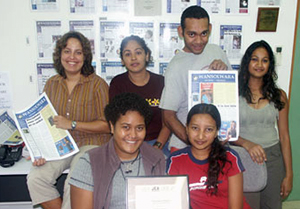
MELBOURNE (Radio Australia / Pacific Media Watch): Journalism training at the University of the South Pacific is back on track following the sudden resignation of the head of the department, Australian Dr Ian Weber.
His departure at the start of the semester came a little over a year since his predecessor, Canadian Dr Marc Edge, left at the end of 2012.
Veteran Pacific journalism educator and broadcaster Pat Craddock from New Zealand has stepped in to take over on his third stint at USP - but only for one semester.
Presenter: Bruce Hill CRADDOCK: Well there’s instability in the sense that we’re not fully staffed. I’ve come back because I’ve got links with the journalism program, I volunteered to come back. But I’m here for one semester, and we have another lecturer, he just joined us yesterday called Dr Matthew Thompson, he’s an Australian, and he’s here for one semester.
CRADDOCK: Well there’s instability in the sense that we’re not fully staffed. I’ve come back because I’ve got links with the journalism program, I volunteered to come back. But I’m here for one semester, and we have another lecturer, he just joined us yesterday called Dr Matthew Thompson, he’s an Australian, and he’s here for one semester.
So both of us could apply for another job, which is going to be advertised, but we may or may not. So the only thing we know for certain is that Shailendra Singh who’s been a lecturer here before, he’ll be coming back after completing his PhD.
So you can see at the middle of the year there’ll be one definite person and there’ll be one job advertised, but as always you’ve got to appoint a person and prise them out of the other job.
HILL: There’s been quite a bit of instability in the journalism department - Dr Marc Edge, he didn’t last terribly long. There were a lot of political problems with him, he was replaced by Ian Weber and he left after less than a year. Now you’re there and only for a semester. Is there some sort of gypsy curse attached to the University of the South Pacific journalism department?
CRADDOCK: Well you’re a journalist, you shouldn’t be asking me about curses, I’d say the facts are that both left, I don’t know the full background, I haven’t bothered going into it. All I can see is that when Dr Weber left, he left at the beginning of this semester, which is a terrible time. So rather than a curse I would put it down to one’s personal ethics.
HILL: You’re only going to be there for one semester. Are you interested in doing it after that or are you definitely going to be replaced by someone else at the end of that?
CRADDOCK: Well I’m only here for one semester. No I’m not interested, and I don’t think I have all the skills for all the different areas. So anyway I’m here for one semester so it really depends on Shailendra Singh, who’s got a good solid background here. And then the new position will be advertised and Matt may or may not apply for it, I don’t know.
HILL: How has all this affected the education of the journalism students at USP? How are they responding to what’s been going on?
CRADDOCK: Well I think in the first week I wasn’t here, but it must be very disturbing for their lecturer to walk in and say I’m leaving. But all I can say is that in a few days I’ve met not all but most of the students, and there’s just this feeling of relief that there is staff there to help them. And of course the local staff have been doing work, we’ve got quite a few teaching assistants who’ve been working on and off here for years. So they’ve been doing a lot of extra work. But I think the confidence is building up, but it’s a bit hard to say for certain.
HILL: What about the reputation of the journalism course at the USP? Has that taken a bit of a hit as a result of this, or is the quality of the education still being maintained?
CRADDOCK: I suspect the reputation has taken a bit of a hit because to lose two course coordinators within two years, and it’s all very public, Marc Edge was very public and he and Weber’s been fairly public with his leaving. So I think there’s something to be built up, so there’s confidence to be built up, yes.
HILL: How important is the journalism department within the USP in a regional sense to train journalists for the whole Pacific?
CRADDOCK: I think it’s very important in a regional sense, because we’ve been running this now for quite a number of years, and there are quite a few people around. They’re working for NGOs, they’re working in the newsroom, one worked as communications officer for the American embassy, one of my former students, who’s now with Fiji Women’s Rights as a communications officer.
So these are very important and we’ve been hearing rumours that there are supposed to be discussions starting at some stage with the Papua New Guinea journalism programme, some form of coordination. I’m not privy to any of the meetings, so I don’t know. But we just hear these rumours. But I would put a very high importance on getting good quality journalists around here.
This work is licensed under a Creative Commons Attribution-NonCommercial 3.0 New Zealand Licence.




